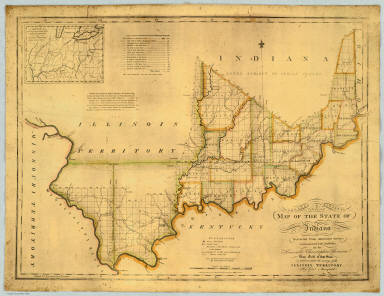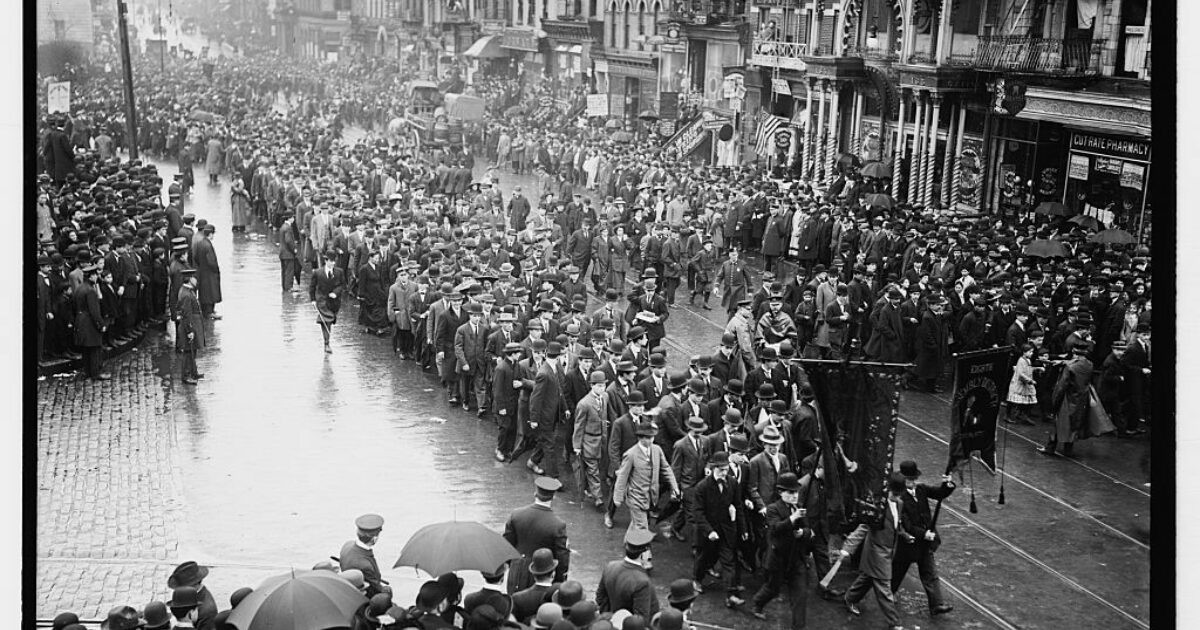 On Feb. 3, 1809, the 10th United States Congress passed legislation to officially establish the Illinois Territory, carved out from the western portion of the existing Indiana Territory. The decision was made after Congress received several petitions from residents in the area complaining of the difficulty of participating in territorial decision-making given their great distance from the territorial capitol in Corydon, and requesting a greater degree of autonomy. The new Illinois Territory included the boundaries of our modern state, as well as land that now makes up parts of Wisconsin, Michigan, and Minnesota.
On Feb. 3, 1809, the 10th United States Congress passed legislation to officially establish the Illinois Territory, carved out from the western portion of the existing Indiana Territory. The decision was made after Congress received several petitions from residents in the area complaining of the difficulty of participating in territorial decision-making given their great distance from the territorial capitol in Corydon, and requesting a greater degree of autonomy. The new Illinois Territory included the boundaries of our modern state, as well as land that now makes up parts of Wisconsin, Michigan, and Minnesota.

Each November, Illinois joins the nation in honoring those who have served in the United States Armed Forces. From the state’s earliest days to the present, Illinois has been home to men and women whose courage and commitment have shaped both our nation’s history and the communities we call home.
Illinois has a proud military legacy; today, the state remains home to over 400,000 veterans. Across Illinois, we preserve the history of our veterans and ensure their stories live on through museums, memorials and community events that keep their service from being forgotten.
In Springfield, the Illinois State Military Museum offers visitors a chance to explore artifacts and personal stories spanning from the Revolutionary War to modern conflicts. Displays include equipment, uniforms, and letters from Illinois soldiers who served around the world. Just outside the city, the Camp Butler National Cemetery stands as a solemn reminder of those who gave their lives in service, with more than 25,000 veterans and their family members laid to rest.
Farther north, the Abraham Lincoln National Cemetery in Elwood provides a peaceful resting place for veterans of every generation. Established in 1999, it continues Illinois’ tradition of honoring those who served—a legacy that stretches back to President Lincoln himself, who established the national cemetery system during the Civil War.
Illinois honors the personal sacrifice of those who served in the US Armed Forces. With a long history of supporting veterans, it remains one of the best states in the nation for service members transitioning to civilian life. From career training and housing support to educational opportunities like the Illinois Veterans Grant (IVG) and expanded mental health services, communities across the state are helping veterans and their families build strong, fulfilling lives after their time in uniform.
This Veterans Day, as we reflect on the freedoms we enjoy, Illinois honors the courage, dedication, and sacrifice of its veterans. Their service reminds us that patriotism is not only something to remember once a year—it’s something we live every day through gratitude, service and community.

Observed the first Monday in September, Labor Day is an annual celebration of the social and economic achievements of American workers. The holiday is rooted in the late 19th century, when labor activists pushed for a federal holiday to recognize the many contributions workers have made to America’s strength, prosperity and well-being.
In 1819, one year after Illinois became a state, the legislature passed the Apprenticeship Act, protecting the rights of minors. Primarily an agricultural state in the nineteenth century’s first decades, Illinois missed the wave of labor activism that swept the East Coast in the 1820s and 1830s, but by 1861 had enough coal miners to serve as the launching point for the first national miner’s union, the American Miners’ Association formed that year in Belleville. In the early 1870s, labor founded the Workingmen’s Party and, beginning in 1877, the Knights of Labor enjoyed great success in a number of Illinois cities. As an important railroad center, Illinois played a significant role in the 1877 national rail strike and troops were sent to Chicago, Decatur, East St. Louis, Galesburg and Peoria.

National Roller Coaster Day on Aug. 16 is a day to go out and celebrate by having your stomach drop and hands go up on some of the thrilling rides Illinois has to offer. This year we highlight Six Flags Great America. This amusement park in Lake County has 16 roller coasters and is among the top 20 in most visited amusement parks in North America!
Let’s start with the brand new Wrath of Rakshasa. This ride is the steepest and most inverted dive coaster in the world. Towering ominously at an impressive 180 feet, this dive coaster invites you to ascend into the shadows before surrendering to a heart-stopping 171-foot drop at a record-breaking beyond-vertical 96 degrees that feels like a descent into the abyss. As the world’s most inverted dive coaster, Wrath of Rakshasa sends you into a whirlwind of five inversions that will test your limits and leave you breathless. It reaches speeds of nearly 67 miles per hour as you race through the demon’s lair, soaring through 3,239 feet of steel track.

As Memorial Day approaches, we take a moment to reflect on the courage and sacrifices of those who served our nation. Illinois has two significant national cemeteries: the Abraham Lincoln National Cemetery and the Camp Butler National Cemetery.
Located in Elwood, the Abraham Lincoln National Cemetery was dedicated in 1999 to honor the legacy of President Lincoln, who established the national cemetery system during the Civil War. This serene space covers nearly 1,000 acres and provides veterans, along with their families, a peaceful final resting place. Its memorial walkway features monuments that recognize veterans from various conflicts and organizations, including the first federally approved monument honoring LGBTQ veterans, which was dedicated in 2015.
The Camp Butler National Cemetery, located near Springfield, carries considerable historical significance. Established in 1861 as a Union Army training camp, it later served as a Confederate prisoner-of-war camp. Today, over 25,000 veterans and their family members rest here, including soldiers from both sides of the Civil War. Notable interments include Medal of Honor recipient Seaman John H. Catherwood and Colonel Otis B. Duncan, the highest-ranking African American officer during World War I.
Both cemeteries are solemn and powerful reminders of Illinois' commitment to honoring those who sacrificed for our freedom.



